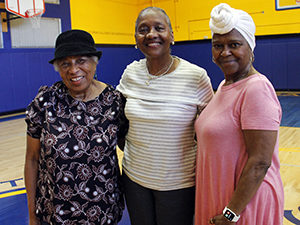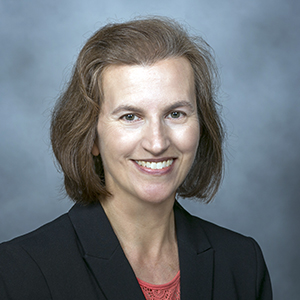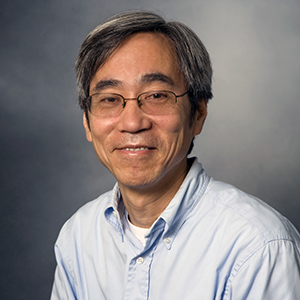In recognition of Breast Cancer Awareness Month, Look insideKP Northern California checks in with the Kaiser Permanente Division of Research’s Pathways Study of breast cancer survivors. Pictured, breast cancer survivor Sandra Domingue does a balance exercise at her local YMCA.

When Sandra Domingue attends her regular fitness class at the Bayview Hunter’s Point YMCA in San Francisco, she’s not thinking about how her time at the gym, which includes both socializing and exercise, could help her live longer.
“It’s just wonderful to come here and see my friends,” she said one recent morning after finishing her one-hour class. “I’m a hugger, so everyone knows I’ll want a hug.”
Domingue is a 72-year-old Kaiser Permanente member and a breast cancer survivor. She’s also a member of the patient advisory board and a participant in the Kaiser Permanente Division of Research Pathways Study. The study is following more than 4,000 Kaiser Permanente Northern California members who’ve received a diagnosis of invasive breast cancer.

One of the study’s well-publicized findings is that breast cancer survivors benefit from social networks and support, much like what Domingue enjoys at her local YMCA.
“Repeatedly, we see that women who have larger, supportive networks have better survival after a diagnosis of cancer,” said Candyce Kroenke, ScD, MPH, co-investigator for the Pathways Study. “My work really focuses on the why and the how of that, so we can figure out how to improve outcomes in women.”
Millions of Breast Cancer Survivors
After skin cancer, breast cancer is the most commonly diagnosed cancer among women in the United States. An estimated 1 in 8 women will develop invasive breast cancer sometime in their life. The good news is that advances in treatment have led to higher rates of women surviving breast cancer. There are now more than 3.1 million women with a history of breast cancer living in the United States.

The growing number of survivors underscores the importance of research around survivorship. Pathways’ principal investigator Lawrence Kushi, ScD said the study, which started enrolling women in 2006, was born of the natural questions breast cancer patients ask after diagnosis.
“They wonder if there are things they can do aside from surgery and conventional therapy that could help improve the quality of their lives, lower the likelihood of cancer recurrence, and maybe prolong their lives,” he said. “When it comes to breast cancer studies that are collecting and analyzing data that include lifestyle choices such as diet, physical activity, dietary supplements, and alternative therapies, this is one of the largest studies in the world.”
Kushi said the Pathways Study is also examining data on the medical care, tumor traits, genetic factors, quality of life, and characteristics of the neighborhoods where breast cancer survivors live. In 2016, the study published findings that women with higher vitamin D levels in their blood following their breast cancer diagnosis had significantly better long-term outcomes.
“As we publish more, I hope our work helps provide women, their families, and their health care providers with strategies and tools to help them live longer, better lives,” Kushi said. “For example, some of our preliminary analysis suggests that women who are more physically active do better in terms of cancer recurrence and survival rates.”
‘It’s Your Health’
Meantime, Sandra Domingue is nearing the 6-year anniversary of her cancer diagnosis, and she is doing well. She said her faith sustained her through her cancer treatments, and she sees her work with the Pathways Study as a way to help the growing number of women who are also survivors.
Doctors at Kaiser Permanente San Francisco quickly diagnosed Domingue with cancer after finding an abnormality during a regular mammogram, so she also urges her friends to stay on top of their cancer screenings.
“I tell them not to be afraid to get their regular mammograms and checkups. It’s your body, and it’s your health.”
Read about Kaiser Permanente programs that offer Peer Support for Breast Cancer Patients.





This Post Has One Comment
I will always be grateful for KP Fremont Surgery having a self referral for lump outreach. My mom went from biopsy the same day she walked in to OR in one week, and started chemo about 6 weeks later, then radiation. Mom was 54 at dx and stage 3 with 14/ 20 positive nodes in her arm. Mom is now 76 and so busy- she has many friends and is always doing something. She mows and trims her yard every week, too. (HUGE YARD!)